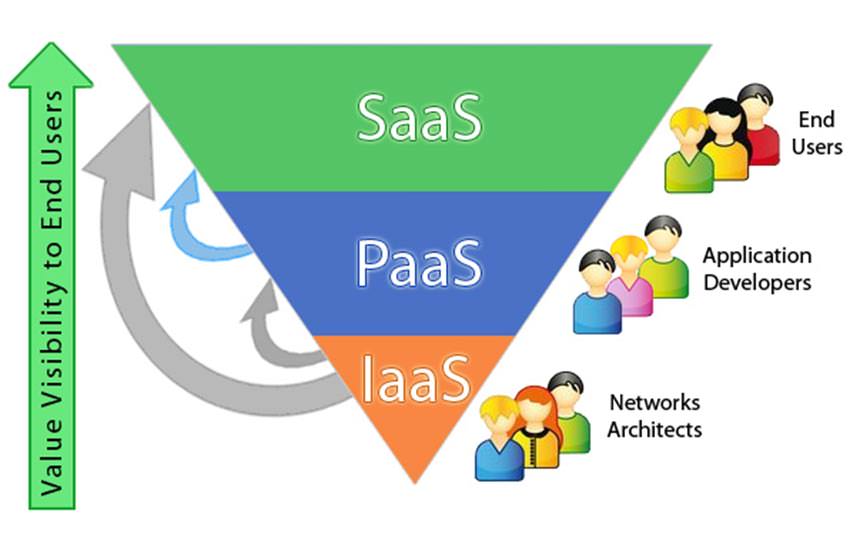Cloud Computing Service Models: SaaS, PaaS and IaaS

Cloud computing has embarked on a tech inspired journey to help SMBs and big entrepreneurs gain appreciably in the enterprise mobility world. The best thing with this technology is that it frees businesses from investing much on infrastructure, hardware and software resources.
In short, it is a type of computing that finds its fuel from shared computing resources, thereby emancipating the businesses from the compulsion of having personal devices or local servers to use various applications. Notably, the entire cloud computing environment revolves around three of its service models, SaaS, PaaS and IaaS. Let’s discuss them one after another followed by their impact and penetration across the globe.
Cloud computing: Software as a Service or SaaS
It is a cloud computing model in which software providers enable the users to access software applications remotely. It negates the need for installation, setup and maintenance of software by service seekers at their end. They can gain access to these applications, better known as on-demand software through mobile phone, web browser, etc.
The best example for SaaS is that of Salesforce which enables authorized users to access its customer relationship management (CRM) system through Internet. Among the other major SaaS providers include Gmail, Yahoomail, SAP, Oracle, Appdynamics, XDrive, Box.next and so on. The type of software these provide includes CRM, email, data sharing, data processing and billing, etc. Customers can avail services from all these providers through either pay per use model or a subscription model.
As per Gartner, the SaaS enterprise application market is all set to explore exponentially and most software companies have started providing custom saas application development services as well. Moreover, the model will also be the reason behind delivering 85% of the latest software applications to the end users by 2015, according to Montclair Advisors.
Cloud computing: Platform as a Service or PaaS
Unlike SaaS which hosts completed cloud applications, the PaaS cloud computing model provides a development platform for both the completed and under-progress applications. Alongside this, it also provides the underlying infrastructure and resources for the latter. It is best for use by small and medium businesses that develop and sell their own applications but find it a costly affair to own a programming environment at their end. Hence instead of bearing the expenditures of managing the entire IT environment, they seek the assistance with the programming models, tools, web server, database execution environment for programming languages, frameworks, and operating system, etc., from a PaaS provider remotely, at a fixed monthly cost.
The model also ensures multifarious benefits for the service seekers that include reduced operating and maintenance cost, enhanced mobility, and so on. Among the major vendors offering the services of PaaS to the global customers include Google App Engine, AWS Elastic Beanstalk, Force.com, AppEngine, Azure, Heroku, Aneka and more. The roster of widely used languages to program applications using PaaS comprise Java, Ruby and Python and various .Net languages.
According to a Gartner report, the PaaS market is expected to witness a significant gain across the globe from 900 Million USD in 2011 to 2.9 Billion USD by 2016, hence making up for 26.6% CAGR. During this period, the report predicts PaaS to capture revenues up to 360 Million USD per year, the larger segment of this earning (35%) would be from Application Platform Services or aPaaS which will keenly be followed by cloud application lifecycle services (12.5%).
Cloud Computing: Infrastructure as a Service or IaaS
No prizes for guessing that IaaS model allows the consumers to directly leverage computing infrastructure components such as physical or virtual machines, firewalls, load balancers, block and file-based storage, various computing resources, virtual LANs and much more. PaaS and SaaS as the other two components. Businesses find it easier to deploy their applications using this model as instead of approaching a hosting company or managing data centers on their own, they have to simply choose an IaaS provider and start getting virtual services for selected resources.
From technology point of view, IaaS model has been among the most successful ones since it leads to a significant reduction in application hosting and maintenance costs among other major benefits. Some widely known IaaS providers are Amazon EC2, Flexiscale, Windows Azure, Rackspace, GoGrid, Joyent, etc. Each of these IaaS providers offer multiple UI and hence varied level of abstractions. Some most preferred user interfaces thus subsume Graphical user Interface, Web services (WS) APIs, command-line tools (CLI), and most times the work is managed by offshore software development firm.
In a report released in April, 2011, Gartner estimated a near three-fold growth in IaaS market, i.e., from 3.7 Billion USD in 2010 to 10.5 Billion USD in 2014. Likewise, a Forester report also predicted a busy involvement of enterprises in IaaS with an expected rise in expenditures from 2.9 Billion USD to 5.85 Billion USD by 2015. Notably, Amazon captures the lion’s share of the global IaaS market as is obvious by this pie chart published on Cloudcow in 2012, followed by Rackspace and Verizon as the post talks about Google’s entry into IaaS domain with its commitment to provide raw computing power to companies through internet.
To conclude, be it SaaS, PaaS, or IaaS all the cloud computing service models play their role eminently in sophisticating businesses performances for enterprises at much reduced cost.
Our Cloud Consulting Services guide you in selecting and deploying the best cloud solutions compatibe for your business to yield maximum efficiency. With the inception of cloud computing, even an individual who finds it hard to develop, host and run an application for use by consumers now finds it easier to transform his ideas. Observing the current status of this vibrant trend, it is easier to anticipate its bright future provided that service vendors keep on offering cheaper and more feasible cloud solutions that almost anyone could access easily, efficiently and remotely.
Finoit makes capable efforts in simplifying the complex enterprise business processes of its global clients. We can also work persistently in providing quality applications that could be leveraged as one of the components of the cloud computing service models. We provide bankable custom software development services and mobile app development services that are used by many of these companies to build respective services.
To know more about the cloud application development services we offer at Finoit, feel free to contact us at the earnest. Remember, we are just few clicks away.

